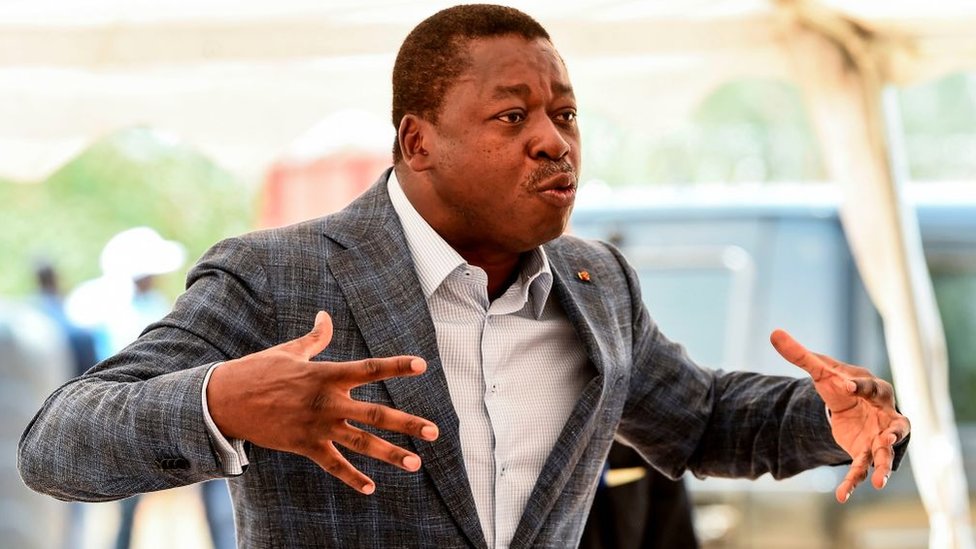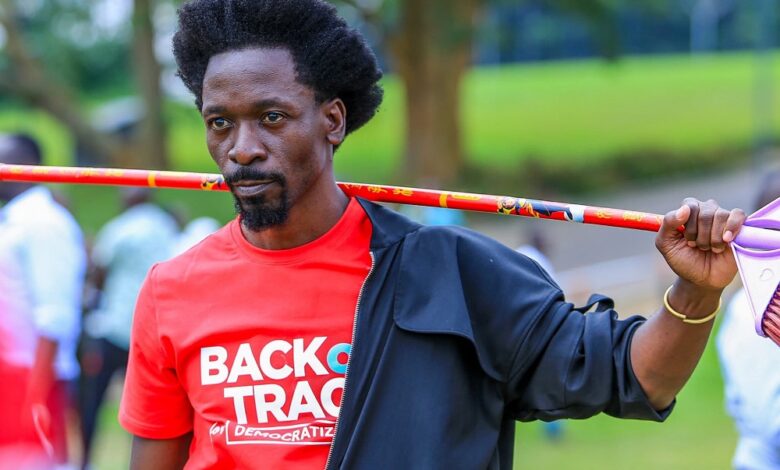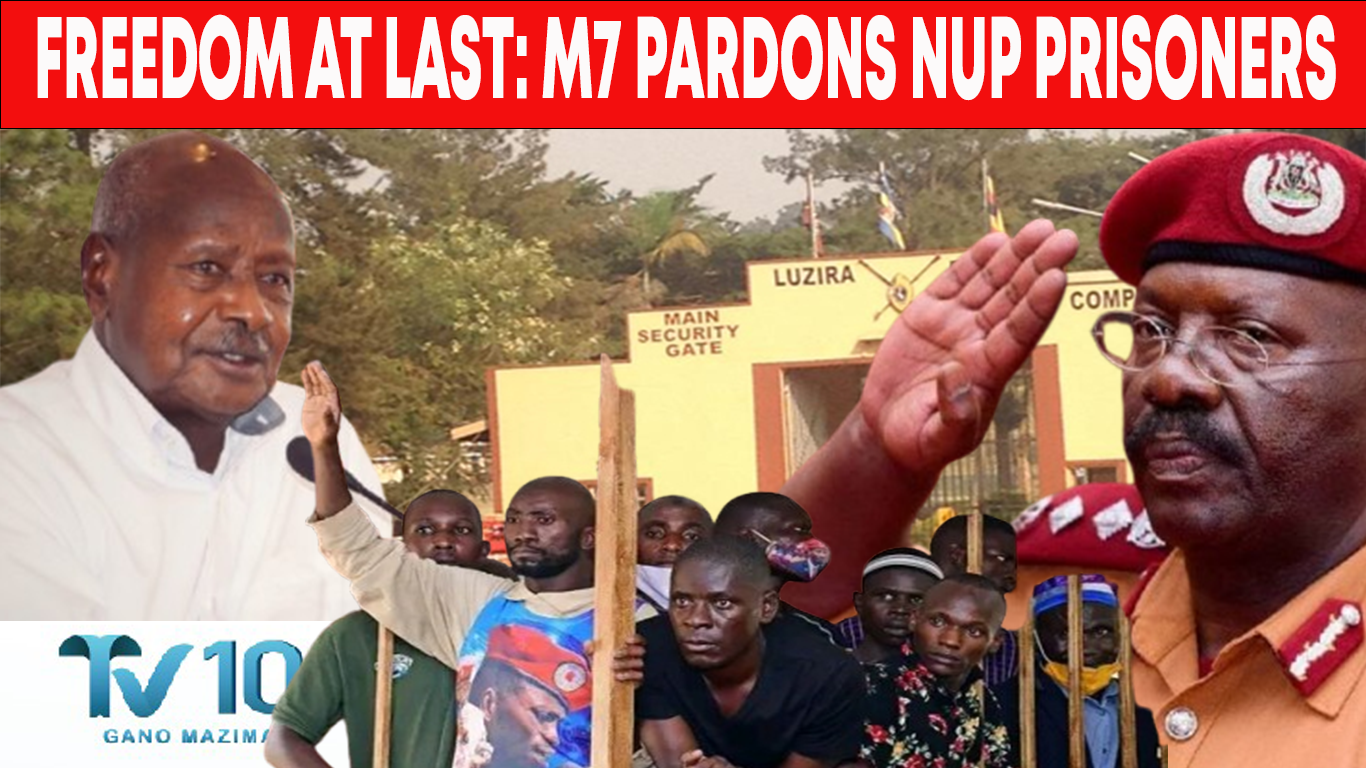
“I WANT TO RULE THIS COUNTRY FOR LIFE LIKE MY FATHER”, PRESIDENT SHOCKED THE WORLD.
By KATUMBA GERALD.
Lawmakers in Togo have approved changes to the constitution linked to presidential term limits and how presidents are elected, which some opposition politicians and civil society groups in Africa have denounced as a constitutional coup.
Togo’s parliament had already adopted the amendments on March 25, but the reforms led to an opposition backlash so President Faure Gnassingbe called for further consultations and a second parliamentary vote.
In a heated debate the lawmakers gave final approval to the reform, just days before the April 29 legislative elections that had also been pushed back due to the issues around the constitutional amendments.
The second reading was passed with all 87 politicians present agreeing to the new system, under which the president will no longer be elected by universal suffrage, but by members of parliament.
The amendments also introduced a parliamentary system of government and shortened presidential terms to four years from five with a two-term limit.
It does not take into account the time already spent in office, which could enable Gnassingbe to stay in power until 2033 if he is re-elected in 2025, a highly likely scenario as his party controls parliament.
Those opposed to the changes fear they could allow further extensions of the president’s 19-year rule and his family’s grip on power. His father and predecessor Gnassingbe Eyadema seized power in the coastal West African country via a coup in 1967.
Who is Faure Gnassingbe?
Togo, a nation of around eight million people, has been ruled by the Gnassingbe family for nearly six decades.
The current president was just six months old when his father, General Gnassingbe Eyadema, seized power in 1967, a few years after participating in the country’s first postcolonial coup in 1963.
His rule was characterised by brutality, his forces accused by Amnesty International of massacring hundreds after a fraudulent election in 1998.
When Eyadema, died in 2005, the military moved swiftly to install his 38-year-old son, Faure Gnassingbe, in the presidential palace, provoking widespread fury. Standing with his Union for the Republic party (UNIR), he won elections shortly afterwards.
However, the United Nations reported that security forces killed up to 500 people in the ensuing unrest.
In 2017 and 2018, there were further bouts of deadly unrest. Thousands of protesters gathered in the streets of Lome, the Togolese capital, to demand that Gnassingbe step down in accordance with the two-term limit set in the original 1992 constitution, a provision scrapped when parliament approved amendments removing presidential term limits in 2002.
Later parliament passed amendments in 2019, allowing limits to be reimposed for presidential terms from that year onwards, thus paving the way for the president’s re-election in 2020 and 2025.
Gnassingbe clinched a fourth term in the latest poll with runner-up Agbeyome Kodjo, who once served as his father’s prime minister, crying foul. He and other opposition members accused the government of using fake polling stations and stuffing ballot boxes.
Kodjo, went into hiding, dying in exile early this year.
Gnassingbe’s opponents now fear the president’s latest amendments to the constitution are designed to keep him in charge even when the presidential term limits end.
What are the proposed constitutional changes?
At first glance, the constitutional reforms appear to give critics what they want, restricting the power of the president, who would be directly appointed by parliament for a single six-year term.
Under the new system, executive power would instead lie with a “president of the council of ministers” and prime minister while Togo’s existing presidency will be reduced to a ceremonial role.
The holder of the new prime ministerial position, which would run for a six-year term, would be “the leader of the party or the leader of the majority coalition of parties following the legislative elections.
Opponents fear he could not only be reappointed president until 2031 but could also then step down from the job and switch to the new role of “president of the council of ministers” in what they say would be a constitutional coup.
“I WANT TO RULE THIS COUNTRY FOR LIFE LIKE MY FATHER”, PRESIDENT SHOCKED THE WORLD.
News
Ugandan Citizen Abducted, Held in Secret Detention for Three Months, Sparks Outrage and Calls for Justice

A disturbing new case of unlawful detention has surfaced, highlighting the ongoing human rights crisis in Uganda. A Ugandan citizen was reportedly abducted and held in a secret facility, known as a “safe house,” for three months, only to be released without charge or explanation. This incident, reported by NTV Uganda, has sparked widespread condemnation and renewed calls for accountability regarding human rights abuses in the country.
While the details surrounding the abduction remain unclear, reports indicate that the individual was taken without due process and held incommunicado—an action that has long been condemned by human rights organizations. The victim’s release, with no charges filed and no clear justification, has angered activists and citizens, who view this as yet another case of egregious abuse of power by the state.
“This is a recurring pattern,” said one human rights activist. “Abductions, secret detentions, and unexplained releases have become all too common in Uganda. These acts violate fundamental human rights and erode public trust in the justice system.”
The use of “safe houses,” unregistered detention facilities reportedly operated by security forces, has been a focal point in numerous allegations of torture and illegal imprisonment. Despite repeated calls from both local and international organizations for their closure and accountability for those involved, little action has been taken to address these violations.
This case underscores the urgent need for reform within Uganda’s security apparatus and greater accountability for human rights abuses. Observers hope that drawing attention to these injustices will spur concrete action to bring those responsible to justice and ensure the protection of basic human rights.
As frustration mounts, calls for both domestic and international pressure to hold the government accountable for such crimes grow louder. “One day, there must be accountability for all these crimes against our people,” stated one social media user, reflecting the sentiments of many Ugandans.
News
NUP Gathering Disrupted: Kyagulanyi Alleges Security Force Harassment and Arrests

National Unity Platform (NUP) President Robert Kyagulanyi has accused Ugandan security forces of using excessive force to disrupt a planned NUP gathering. The allegations were detailed in a statement shared on Twitter, following an event held to honor children of NUP supporters who were killed, disappeared, or detained for their political beliefs.
According to Kyagulanyi, security personnel, under the command of an officer identified as Asiimwe, carried out a preemptive operation early in the morning upon learning of the NUP’s plans. The forces allegedly stormed the premises, arrested workers, and deployed tear gas to disperse those present.
“The criminals under the command of one Asiimwe deployed early morning, arrested our workers, and threw tear gas into our premises. They’ve cordoned off the premises and blocked all people from accessing the place,” Kyagulanyi wrote.
Among those reportedly arrested were Saava Peter, Mudenya Samson, and Turyasingura Samson. Kyagulanyi claimed the detained workers were subjected to beatings and interrogated about their political affiliations, with security operatives labeling them as terrorists.
“These JATT operatives asked the workers who they support politically, branding them terrorists and criminals—their only crime being that they work with us. You can imagine the indignity!” Kyagulanyi lamented.
This incident adds to the growing tension in Uganda’s political climate, where opposition parties frequently accuse the government of stifling dissent. Despite the challenges, Kyagulanyi ended his statement with a message of defiance and optimism, proclaiming, “UGANDA WILL BE FREE.”
NUP Gathering Disrupted: Kyagulanyi Alleges Security Force Harassment and Arrests
News
Sudan Demands Apology from Uganda Over Army Chief Muhoozi Kainerugaba’s Threat to Invade Khartoum

Sudan has demanded an official apology from Uganda over “offensive and dangerous” comments made by the chief of Uganda army staff, who threated to invade Khartoum, the Sudan Tribune has reported.
General Muhoozi Kainerugaba, son of Ugandan President Yoweri Museveni and CDF of the Ugandan army, posted two comments on the X platform on Tuesday in which he threatened “to capture Khartoum” with the support of the US President elect Donald Trump after he takes office. The posts were deleted later.
“The government of Sudan demands and official apology from the Ugandan government for the offensive and dangerous comments of the army commander,” Sudan’s foreign ministry said in a statement that the Sudan Tribune said it has seen.
Sudan Demands Apology from Uganda Over Army Chief Muhoozi Kainerugaba’s Threat to Invade Khartoum







